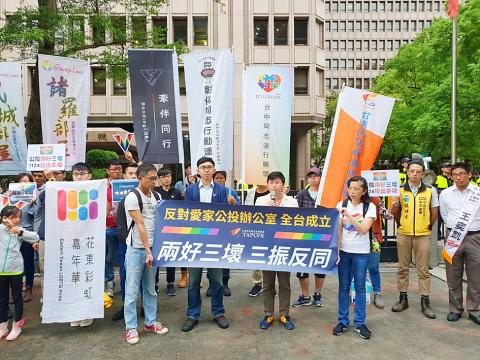Two pro-marriage equality referendums are likely to be held alongside the local elections next month, after the Central Election Commission yesterday announced that they have passed the second-phase legal threshold.
The commission on Tuesday is to decide whether the proposals will be on the ballot for the nine-in-one elections on Nov. 24.
The proposals, initiated by Social Democratic Party member Miao Po-ya (苗博雅) and advocate Wang Ting-yu (王鼎棫) respectively, have gathered enough signatures to clear the 281,745 threshold for the second phase of the process, the commission said.

Photo: Li Hsin-fang, Taipei Times
The proposals directly oppose three referendums organized by conservative groups and Chinese Nationalist Party (KMT) lawmakers that have already cleared the commission’s review process.
Miao’s referendum proposal to legalize same-sex marriage under the marriage chapter of the Civil Code garnered 432,329 valid and 42,448 invalid signatures, 2,498 of which were forgeries and 44 belonged to dead people, it said.
Wang’s proposal supporting lessons on emotional and sex education and homosexuality through the Gender Equity Education Act (性別平等教育法) garnered 438,066 valid and 46,183 invalid signatures, including 2,580 suspected forgeries and 42 belonging to the deceased, the commission said.
The commission is likely to clear the proposals for the ballot box while pressing forgery charges against their organizers, as it has done for three KMT-initiated referendums.
Later yesterday, the Taiwan Alliance to Promote Civil Partnership Rights (TAPCPR) and other groups held a news conference ouside the commission in Taipei to express their “resolute opposition” to the anti-LGBT referendums initiated by the Happiness of the Next Generation Alliance and other groups.
The Happiness of the Next Generation Alliance is associated with the referendums to legally define marriage as a union between a man and a woman, recognize same-sex relationships by means other than marriage and to forbid mentioning homosexuality in gender-equality classes at elementary and junior-high schools.
The commission never should have allowed the three proposals, which are potentially unconstitutional, to become referendums, TAPCPR executive officer and LGBT rights attorney Victoria Hsu (許秀雯) said.
The TAPCPR said it has applied with the commission to establish offices to campaign against the anti-LGBT referendums, as referendum opponents are entitled to participate in the commission’s televised public forums and debates under Article 20 of the Referendum Act (公民投票法).
“The TAPCPR is prepared to expose anti-LGBT organizations that espouse family values to mask their true agenda of discrimination and hate,” the organization said. “While anti-LGBT groups have better funding to buy ads, we will use public debate as our platform to spread factual information.”

Right-wing political scientist Laura Fernandez on Sunday won Costa Rica’s presidential election by a landslide, after promising to crack down on rising violence linked to the cocaine trade. Fernandez’s nearest rival, economist Alvaro Ramos, conceded defeat as results showed the ruling party far exceeding the threshold of 40 percent needed to avoid a runoff. With 94 percent of polling stations counted, the political heir of outgoing Costa Rican President Rodrigo Chaves had captured 48.3 percent of the vote compared with Ramos’ 33.4 percent, the Supreme Electoral Tribunal said. As soon as the first results were announced, members of Fernandez’s Sovereign People’s Party

EMERGING FIELDS: The Chinese president said that the two countries would explore cooperation in green technology, the digital economy and artificial intelligence Chinese President Xi Jinping (習近平) yesterday called for an “equal and orderly multipolar world” in the face of “unilateral bullying,” in an apparent jab at the US. Xi was speaking during talks in Beijing with Uruguayan President Yamandu Orsi, the first South American leader to visit China since US special forces captured then-Venezuelan president Nicolas Maduro last month — an operation that Beijing condemned as a violation of sovereignty. Orsi follows a slew of leaders to have visited China seeking to boost ties with the world’s second-largest economy to hedge against US President Donald Trump’s increasingly unpredictable administration. “The international situation is fraught

MORE RESPONSIBILITY: Draftees would be expected to fight alongside professional soldiers, likely requiring the transformation of some training brigades into combat units The armed forces are to start incorporating new conscripts into combined arms brigades this year to enhance combat readiness, the Executive Yuan’s latest policy report said. The new policy would affect Taiwanese men entering the military for their compulsory service, which was extended to one year under reforms by then-president Tsai Ing-wen (蔡英文) in 2022. The conscripts would be trained to operate machine guns, uncrewed aerial vehicles, anti-tank guided missile launchers and Stinger air defense systems, the report said, adding that the basic training would be lengthened to eight weeks. After basic training, conscripts would be sorted into infantry battalions that would take

GROWING AMBITIONS: The scale and tempo of the operations show that the Strait has become the core theater for China to expand its security interests, the report said Chinese military aircraft incursions around Taiwan have surged nearly 15-fold over the past five years, according to a report released yesterday by the Democratic Progressive Party’s (DPP) Department of China Affairs. Sorties in the Taiwan Strait were previously irregular, totaling 380 in 2020, but have since evolved into routine operations, the report showed. “This demonstrates that the Taiwan Strait has become both the starting point and testing ground for Beijing’s expansionist ambitions,” it said. Driven by military expansionism, China is systematically pursuing actions aimed at altering the regional “status quo,” the department said, adding that Taiwan represents the most critical link in China’s